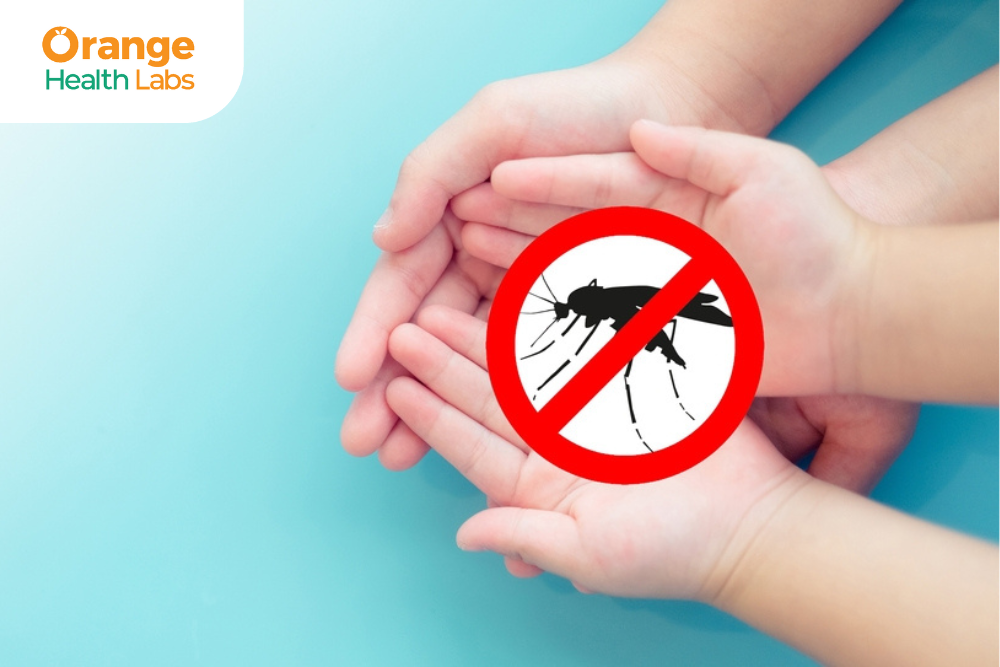Search for tests or checkups
SupportLifestyle Changes to Reduce Dengue Risk

Introduction
Dengue fever is a mosquito-borne viral illness that presents a significant global health concern, particularly in subtropical and tropical areas. Globally, 390 million dengue infections are reported annually. In 2023, the highest number of dengue infections was recorded in over 80 countries. While there are various treatments including vaccines for the treatment of dengue infection, the disease burden remains high; therefore, preventing the occurrence of dengue is of utmost importance. Along with medical and environmental measures, lifestyle modifications also play a vital role in mitigating the risk of dengue. This article aims to provide a basic understanding of dengue and preventive measures that one can take in their daily life to prevent the spread of dengue fever.
Understanding Dengue and Its Transmission
What Is Dengue?
Dengue fever is a viral infection caused by the dengue virus, which belongs to the Flaviviridae family. It gets transmitted due to the bite of infected Aedes mosquitoes, Aedes aegypti and Aedes albopictus. The hallmark symptoms of dengue fever include sudden onset high fever, severe headache, pain behind the eyes, joint and muscle pain, rash, and swollen glands. In severe cases, dengue can progress to a potentially fatal complication known as severe dengue, characterised by symptoms such as bleeding through the nose or gums, rapid breathing, and pale and cold skin.
How is Dengue Transmitted?
The lifestyle of the mosquito that spreads dengue fever governs the transmission of dengue. The Aedes mosquito undergoes four stages in its life cycle: egg, larva, pupa, and adult. Female mosquitoes lay eggs in stagnant water, and these eggs hatch into larvae, which then develop into pupae before emerging as adult mosquitoes. Aedes mosquitoes are primarily daytime biters, with peak biting activity occurring in the early morning and late afternoon. They thrive in urban environments, often breeding in domestic water containers found in and around human dwellings such as rooftops and overhead tanks. When a female mosquito feeds on the blood of a dengue-infected person during the acute phase of the illness, it becomes a carrier of the virus. Subsequently, when this infected mosquito bites another individual, it can transmit the virus, thus perpetuating the cycle of dengue transmission.
Key Lifestyle Changes to Reduce Dengue Risk
Dengue prevention requires multiple interventions beyond medical treatment. These encompass lifestyle modifications and community engagement.
Eliminating Mosquito-Breeding Sites
One of the most effective ways to prevent dengue transmission is to eliminate potential breeding sites for Aedes mosquitoes. These mosquitoes lay their eggs in stagnant water, which can accumulate in various household containers and outdoor areas.
Practical steps for maintaining a clean and dry environment:
- Regularly inspect your surroundings for any containers that may collect water, such as flowerpots, buckets, and discarded tyres.
- Empty and clean water storage containers, such as animal drinking bowls and bird baths, at least once a week to prevent the buildup of stagnant water.
- Repair broken pipes and septic tanks as well as cover them with wire mesh.
- Store outdoor items that can collect water, such as buckets, barrels, and cisterns in a covered area or upside down to prevent them from becoming breeding sites for mosquitoes.
Personal Protection Measures
In addition to eliminating breeding sites, personal protection measures are essential for reducing the risk of mosquito bites and dengue infection.
Recommendations for using mosquito repellents, nets, and protective clothing:
- Use insect repellents containing DEET, oil of lemon eucalyptus, or picaridin on exposed skin and clothing before going outdoors.
- Use mosquito nets treated with insecticide while sleeping, particularly in areas where mosquito-borne diseases are prevalent.
- Wear long-sleeved shirts, long pants, socks, and closed-toe shoes to minimise exposed skin and reduce the risk of mosquito bites, especially during outdoor activities.
Community Efforts
Community involvement is crucial for the success of dengue prevention programs, as collective action can yield significant benefits in reducing mosquito populations and preventing disease transmission.
One can ensure community involvement in dengue prevention programs by following these steps:
- Organise community clean-up campaigns to remove potential mosquito breeding sites from public spaces and neighbourhoods.
- Raise awareness about dengue prevention and control measures through educational campaigns, community meetings, and outreach activities.
- Encourage community members to report suspected dengue cases and collaborate with local health authorities.
- Implement timely interventions such as vector control and case management.
Landscaping and Home Design for Dengue Prevention
Garden and Backyard Maintenance
Maintaining a well-kept garden and backyard is essential for reducing mosquito-breeding areas around the home. Proper landscaping practices can create an environment that is less conducive to mosquito breeding.
How proper landscaping can reduce mosquito-breeding areas:
- Trim vegetation regularly to eliminate hiding places for mosquitoes and reduce areas where stagnant water can accumulate.
- Remove standing water from flowerpots, bird baths, and decorative fountains to prevent mosquitoes from laying eggs.
- Always screw the lids for water storage containers tightly.
- Maintain swimming pools in better condition.
- Carefully irrigate the garden and make sure to get rid of standing water.
- Maintain running water in fountains and artificial lakes to prevent stagnant water.
Home Structural Modifications
Making structural modifications to homes can further enhance dengue prevention efforts by reducing entry points for mosquitoes and improving ventilation. Tips for improving home ventilation and using mosquito-proofing techniques:
- Install screens on doors and windows to prevent mosquitoes from entering the home while allowing for adequate airflow.
- Seal holes and gaps in walls, windows, and doors to eliminate potential entry points for mosquitoes.
- Use mosquito nets over the bed to provide additional protection while sleeping, particularly in areas where dengue is endemic.
- Check for items that may hold water inside and outside your home such as planters, flowerpots, buckets, and trash containers.
- Use an air conditioner if feasible instead of opening doors and windows if the mosquito population is high.
- Use an insecticide to kill mosquitoes inside your home.
Diet and Immunity Support Against Dengue
Maintaining a healthy diet is essential for a strong immune system. It may also support recovery and dengue prevention. Consume immune-boosting foods and stay hydrated to enhance the ability of your body to fight off infections and recover from dengue fever.
Boosting Immunity
Consuming a balanced diet is essential for boosting immunity against mosquito-borne illnesses. Include colourful vegetables and fruits in your diet. Various antioxidants present in apples, berries, eggplant, onion, raisins, etc., may reduce the risk of infections. Incorporate a diverse range of nuts, including walnuts, almonds, and seeds like chia, sunflower, and flaxseeds, into your diet for a nutrient-packed immunity boost. Include probiotics like yoghurt, cheese, buttermilk, and soybeans in your diet. Utilise herbs and spices like ginger, turmeric, garlic, cinnamon, pepper, nutmeg, and cardamom in your diet for their natural immunity-boosting qualities.
Hydration and Nutrition
Hydration is crucial for maintaining optimal health, especially during periods of increased risk of dengue infection. Ensure ample fluid intake with a mix of herbal teas, warm soups, and broths. Additionally, cold beverages like lassi, coconut water, and lemon water offer refreshing options that contribute to hydration and detoxification. Incorporating hydrating foods such as fruits and vegetables with high water content, including cucumbers, watermelon, and oranges, further supports hydration and provides essential vitamins and minerals necessary for immune function.
Technological and Natural Solutions for Mosquito Control
In the ongoing battle against mosquito-borne illnesses like dengue, innovative mosquito control technologies and natural solutions play a crucial role in reducing mosquito populations and curbing the transmission of dengue.
Innovative Mosquito Control Technologies
Advancements in mosquito control technologies help combat mosquito-borne diseases. Mosquito traps in novel designs use advanced technologies to attract and capture mosquitoes. Some traps use a combination of carbon dioxide, moisture, heat, etc. Household aerosol sprays are available for effective short-term relief. Hand-held ULV foggers or fogging devices are used outdoors for temporary relief.
Using Natural Predators and Repellents
In addition to technological solutions, harnessing the power of natural predators and repellents can aid in mosquito control efforts. Natural predators like bats, dragonflies, and certain species of fish feed on mosquito larvae, helping to naturally regulate the mosquito population. Introducing these predators into the ecosystem or creating habitats that attract them can provide sustainable, environmentally friendly mosquito control solutions. Furthermore, certain plants, such as citronella, rosemary, peppermint, and lavender contain compounds that repel mosquitoes.
Conclusion
In conclusion, adopting lifestyle changes and implementing effective mosquito control measures are crucial steps in minimising the risk of dengue and other mosquito-borne diseases. By eliminating breeding sites, practicing personal protection measures, and engaging in community efforts, individuals can significantly reduce their exposure to mosquitoes and the diseases they transmit. Additionally, embracing technological innovations and natural solutions for mosquito control further enhances disease prevention efforts and promotes sustainable mosquito management practices.
Book CBC Test in your city: Dengue NS1 Test in Bangalore | Dengue NS1 Test in Mumbai | Dengue NS1 in Noida | Dengue NS1 Test in Hyderabad | Dengue NS1 Test in Gurgaon | Dengue NS1 Test in Faridabad | Dengue NS1 Test in Delhi

Understanding Glucose Tolerance Test: Normal Range Results and Interpretation

Connection between CRP Levels and Inflammation
